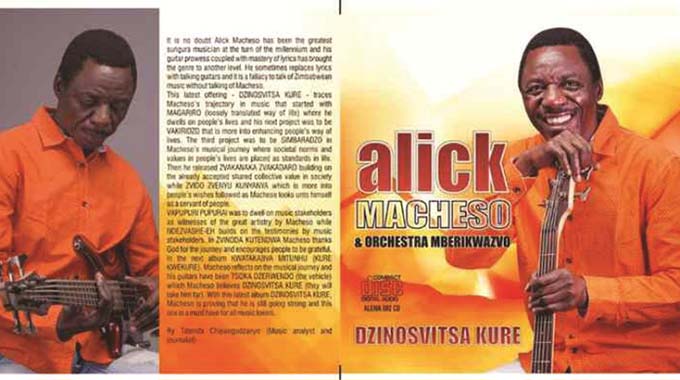‘Dzinosvitsa Kure’: Beyond entertaining!

Tinashe Mutero
In 2016, after years of studio hiatus which seemed to have threatened the professional life of Sungura King, Alick Macheso, he finally did a Lazarus act on the special genre.
Before the release of “Tsoka Dzerwendo”, I opined elsewhere that the album was the requiem of Zimdancehall.
The prediction could have missed the mark by a whisker but the popularity of microwaved music sloped. So big was “Tsoka Dzerwendo” that besides Andy Muridzo’s “Dherira” and perhaps Soul Jah Love’s “Pamamonya Ipapo”, there is hardly any other musician who comes to mind who made music which infiltrated organically.
Most benefited from art washing. Of course, this is a debatable subject which we might want to discuss when we are free.
Two years later Baba Sharo releases another scorcher! “Dzinosvitsa Kure!” This has left naysayers dumbfounded despite the short time it has been on the shelves so far. There is a disquieting silence. Hakuna anoti nyoo! Total absence of chirping. It’s just good music playing. Macheso is playing everywhere. He has given us a worthy break from political jingles.
“Dzinosvitsa Kure” has gone beyond entertaining. I listened to the album on the day of release while I was some thousands of kilometres away from home.
The music got me going through the corridors of nostalgia. Differently put, Macheso’s music has a sense of place. It’s a sound that makes one feel proudly Zimbabwean. Or could it be that Macheso has successfully reinvented the formula that saw him making great hits like “Zvido Zvenyu Kunyanya.”
Macheso is a social commentator of note. The six-track album is a manual for humane living. On “Pfuma Yacho”, Macheso speaks to those among us who use sorcerers and whatever other evil means to gain wealth without breaking sweat.
The persona in the song laments “pfuma yacho unoidya naniko, wapedza vana unoidya naniko? Zimwe zvinoda hama uchazviudza aniko?” (Who will you enjoy your wealth with when you have had every child of yours perish? Some wealth needs to be shared and enjoyed amongst relations).
Granted our country’s economy is not performing well, there is really nothing and nowhere one can make a meaningful income but vanhu vezvikwambo, those who rely on money spinning goblins, make it worse.
You literally do not see where your earnings are going. They just slip away. Of course, some among us do not believe in this and it’s okay.
However, one cannot miss the sombre but beautiful desperation in Macheso’s voice as he sings. He has seen some of his own earnings slip away perhaps? Perhaps he sits perched on the wayfarer’s pedestal watching as society goes about its dark and devious madness.
It is a song with a soul, a life beyond 9 minutes and 45 seconds. Good art has no affixed meaning. The song could be about thieving executives who are enjoying life at the expense of the rest of us.
Macheso is however, wary of hate prevailing around us. On “Ndakakutadzirei” he directs his message to “haters” — those among us who frown at any success which does not bear they name.
He urges people to work harder, excel and let the output make the noise. Most importantly, the song brings us to interrogate the source of our grudges and hate. At times our discontent and displeasure stems out of jealous, godo ndorinenge richibaya.
I should hasten to say that I heard the “Ndakakutadzirei” around the time he released “Gungwa”. Whoever Macheso is singing about did us a great favour, they torched his creative nerve; the juices are exploding.
Other songs on the album include “Madzitete”, “Vane Zvavanoda”, “Kudzwai” and “Chikuru Kurarama”. On “Madzitete” and “Chikuru Kufema”, Macheso sings about forgiveness.
Often, we go against our parents’ teachings and wishes either consciously or unknowingly, either way hurting our parents. Madzitete is a plea to the extended family asking them to play an intermediary role uniting the parents and their children.
Saying sorry and acknowledging where they are wrong is very important least one wants to live an unhappy life.
“Chikuru Kurarama “will resonate with the unlucky in love, people in rocky and abusive relationships. Baba Sharo, who by any measure is a marriage guru, cautions ‘do not hang around an abusive relationship.
His energetic performances might fool many to think the man is still young and inexperienced to share wisdom on love. He is 50! And once had two wives. Hardly a spring chicken now, is that not so? Songs on “Dzinosvitsa Kure” are themed around community.
The album is both entertaining and prescriptive of how we should interactively heal our broken communities.
The songs have the power to heal. The music has profound effect, it teaches us what to think and feel.
The way it sinks and flows with the bloodstream connecting the soul to the cosmos cannot be explained in any meaningful words. “Dzinosvitsa Kure” is a musicgasm.
Many musicians will struggle to be relevant after Macheso’s release.









Comments